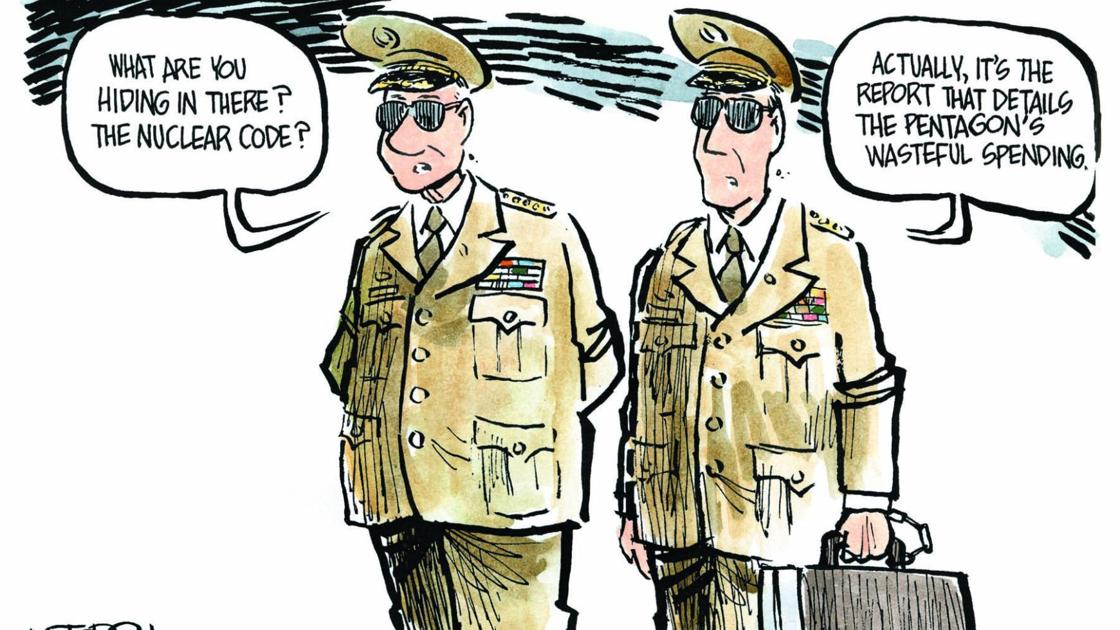
‘Unprecedented, Wasteful, and Obscene’: House Approves $1.48 Trillion Pentagon Budget
“For the love of god, can we all
stop pretending like this is somehow anything other than a continued orgy of
unprecedented, wasteful, and obscene spending at the Pentagon.”
—Stephen Miles, Win Without War
WASHINGTON (July 26, 2019) — In a bipartisan deal that one anti-war critic said demonstrates how thoroughly “broken and captured Washington is by the Pentagon,” 219 House Democrats and 65 Republicans on Thursday voted to approve a budget agreement that includes $1.48 trillion in military spending over the next two years.
Just 16 Democrats—including Reps. Ilhan Omar (D-Minn.) and Ayanna Pressley (D-Mass.)—voted against the two-year, $2.7 trillion budget agreement. Largely due to expressed concerns about the deficit, 132 Republicans and Rep. Justin Amash (I-Mich.) also voted no.
The final vote was 284-149. (See the full roll call.)
The House passage of the budget deal, which President Donald Trump quickly applauded on Twitter as a victory for the military, comes after the Congressional Progressive Caucus threatened in April to tank the measure in opposition to its out-of-control Pentagon outlays.
But most of the Progressive Caucus voted for the agreement on Thursday, pointing to increases in domestic spending.
“It’s not a perfect deal by any means,” Reps. Pramila Jayapal (D-Wash.) and Mark Pocan (D-Wis.), co-chairs of the Progressive Caucus, said in a statement ahead of the vote. “This deal does not address the bloated Pentagon budget, but it does begin to close the gap in funding for families, by allocating more new non-defense spending than defense spending for the first time in many years.”
Stephen Miles, executive director of Win Without War, took issue with the latter claim in a series of tweets Thursday.
“You’re no doubt hearing a lot of crowing from Democrats about how the deal they struck with Trump gives more money to ‘non-defense’ spending than to ‘defense,'” Miles wrote. “Let’s be clear that by every measure, save the one they’re using, that’s simply not true.”
“Under this deal, the Pentagon and its affiliated programs will get $1.48 trillion over the next two years. The entire rest of gov’t, including the VA btw, will get $1.30 trillion. That’s $178.6 billion more for the Pentagon than the whole rest of gov’t,” Miles wrote. “So, for the love of god, can we all stop pretending like this is somehow anything other than a continued orgy of unprecedented, wasteful, and obscene spending at the Pentagon.”
William Hartung, director of the Arms and Security Project at the Center for International Policy, wrote for Forbes this week that the budget deal “vastly overpays for the Pentagon.”
“At $738 billion for Fiscal Year 2020 and $740 billion for Fiscal Year 2021,” wrote Hartung, “the agreement sets the table for two of the highest budgets for the Pentagon and related work on nuclear warheads at the Department of Energy since World War II.”
“The proposed figures are higher than spending at the height of the Vietnam and Korean Wars, and substantially more than the high point of the Reagan buildup of the 1980s,” Hartung added. “And the Fiscal Year 2020 and Fiscal Year 2021 numbers are only slightly less than spending in 2010, when the United States had 180,000 troops in Iraq and Afghanistan, roughly nine times the number currently deployed.”

The sweeping 2020 budget agreement is expected to pass the Senate next week, and Trump has signaled he will sign the measure.
Senate Majority Leader Mitch McConnell (R-Ky.) joined the presidentin celebrating the increase in military spending, which is significantly more than the Pentagon requested.
The deal, McConnell said, “achieves the No. 1 goal of the Republican side of the aisle, providing for the common defense.”
As Common Dreams reported on Tuesday, House Speaker Nancy Pelosi (D-Calif.) came under fire from progressives for striking the budget agreement with Treasury Secretary Steve Mnuchin. Specifically, critics highlighted the deal to suspend the debt ceiling until 2021, a move that could give Republicans power to cripple the next president’s agenda.
“If you really listen,” wrote Splinter‘s Paul Blest, “you can almost hear [Texas Sen.] Ted Cruz yelling on the floor of the Senate that Congress shouldn’t raise the debt limit by one more dollar unless President Bernie Sanders promises to drop his demand for Medicare for All.”
Our work is licensed under a Creative Commons Attribution-Share Alike 3.0 License. Feel free to republish and share widely.

In Budget Deal, White House And Congress Overpay For The Pentagon
(July 23, 2019) — The newly proposed two-year budget deal between the White House and Congress has one major flaw. It vastly overpays for the Pentagon.
At $738 billion for Fiscal Year 2020 and $740 billion for Fiscal Year 2021, the agreement sets the table for two of the highest budgets for the Pentagon and related work on nuclear warheads at the Department of Energy since World War II. The proposed figures are higher than spending at the height of the Vietnam and Korean Wars, and substantially more than the high point of the Reagan buildup of the 1980s.
And the Fiscal Year 2020 and Fiscal Year 2021 numbers are only slightly less than spending in 2010, when the United States had 180,000 troops in Iraq and Afghanistan, roughly nine times the number currently deployed.
One might have thought that Pentagon budget boosters would be satisfied with these massive numbers. But you would be wrong. House Armed Services Committee ranking Republican Mac Thornberry (R-TX) grudgingly accepted the budget deal, but couldn’t help saying, “I believe our military needs more funding than this agreement provides.”
Senate Armed Services Committee chair James Inhofe (R-OK) declared himself “disappointed” that the deal fell short of the $750 billion proposed by the Trump administration, and cited the recommendation of the National Defense Strategy Commission (NDSC) that Pentagon spending should rise 3 to 5 percent per year, adjusted for inflation, for the next five to ten years.
The 3 to 5 percent recommendation is absurdly high. Calculations by Taxpayers for Common Sense indicate that the 5 percent growth rate would push Pentagon spending to over $970 billion by Fiscal Year 2024, well on the way to a figure of well over $1 trillion within the next ten years.
Inhofe’s reference to the NDSC is telling. That congressionally-mandated panel was essentially an exercise in threat inflation that proposes a militarized foreign policy while ignoring the greatest security challenges we face, many of which are not military in nature.
The NDSC’s own reportacknowledges that their proposed increases are “more illustrative than definitive.” But that hasn’t prevented Pentagon budget boosters like Senator Inhofe from citing the NDSC’s recommendations as gospel, and as the one true guide to how much the country should spend on the Pentagon for years to come.
The NDSC’s flaws are many, but chief among them is the failure to mention one of the greatest security risks we face – climate change. U.S. policy makers and Pentagon planners should spend less time spinning out scenarios for how to fight a war with China and more on figuring out how to cooperate with Beijing in coming up with a plan to cooperate in heading off a climate catastrophe.
Working together in this sphere could also serve as a building block towards resolving other economic and security concerns in the U.S.-China relationship without sparking a new arms race or increasing the risks of war, which would be a disaster beyond reckoning given that it would involve two nuclear-armed powers.
The NDSC also endorses an increasingly confrontational policy with Russia, Iran, and North Korea, all nations where diplomacy on the central issue of curbing the spread and number of nuclear weapons would be far more fruitful than war or threats of war.
Last but not least, the panel counsels what is in essence still a military-led approach to the challenge of global terrorism, despite the unsuccessful and at times disastrous consequences of pursuing this strategy in Iraq and Afghanistan.
There is another way. The Center for International Policy’sSustainable Defense Task Force – a group of experts that includes former Pentagon officials and military officers, former White House budget officials, and ex-Congressional budget experts — outlines a plan that could save at least $1.2 trillion from current Pentagon plans over the next decade by pursuing a more realistic and restrained strategy that would abandon nation building and large-scale counterinsurgency as pillars of U.S. policy; take a more balanced, less confrontational approach to the economic, political and security challenges posed by Russia and China; pursue diplomacy as the policy of choice for addressing the nuclear issues posed by Iran and North Korea; adopt a deterrence-only nuclear policy along the lines proposed by the organization Global Zero; and cut waste and unnecessary overhead at the Pentagon.
The task force’s approach would make America and its allies safer for less by discarding the most counterproductive policies that have been implemented during this century and instead emphasizing the most urgent challenges to U.S. and global security.
The new budget deal is indeed a disappointment, but not for the reasons suggested by Senator Inhofe and other advocates of endless increases in the Pentagon budget. The deal allows the Pentagon to spend too much, set the wrong priorities, and put our future security at risk by hyping challenges that are not amenable to traditional military solutions. We need a new debate on America’s defense priorities, and the sooner it begins the better.
William Hartung is the director of the Arms and Security Project at the Center for International Policy. He is the author of Prophets of War: Lockheed Martin and the Making of the Military-Industrial Complex (Nation Books, 2011)
Posted in accordance with Title 17, Section 107, US Code, for noncommercial, educational purposes.